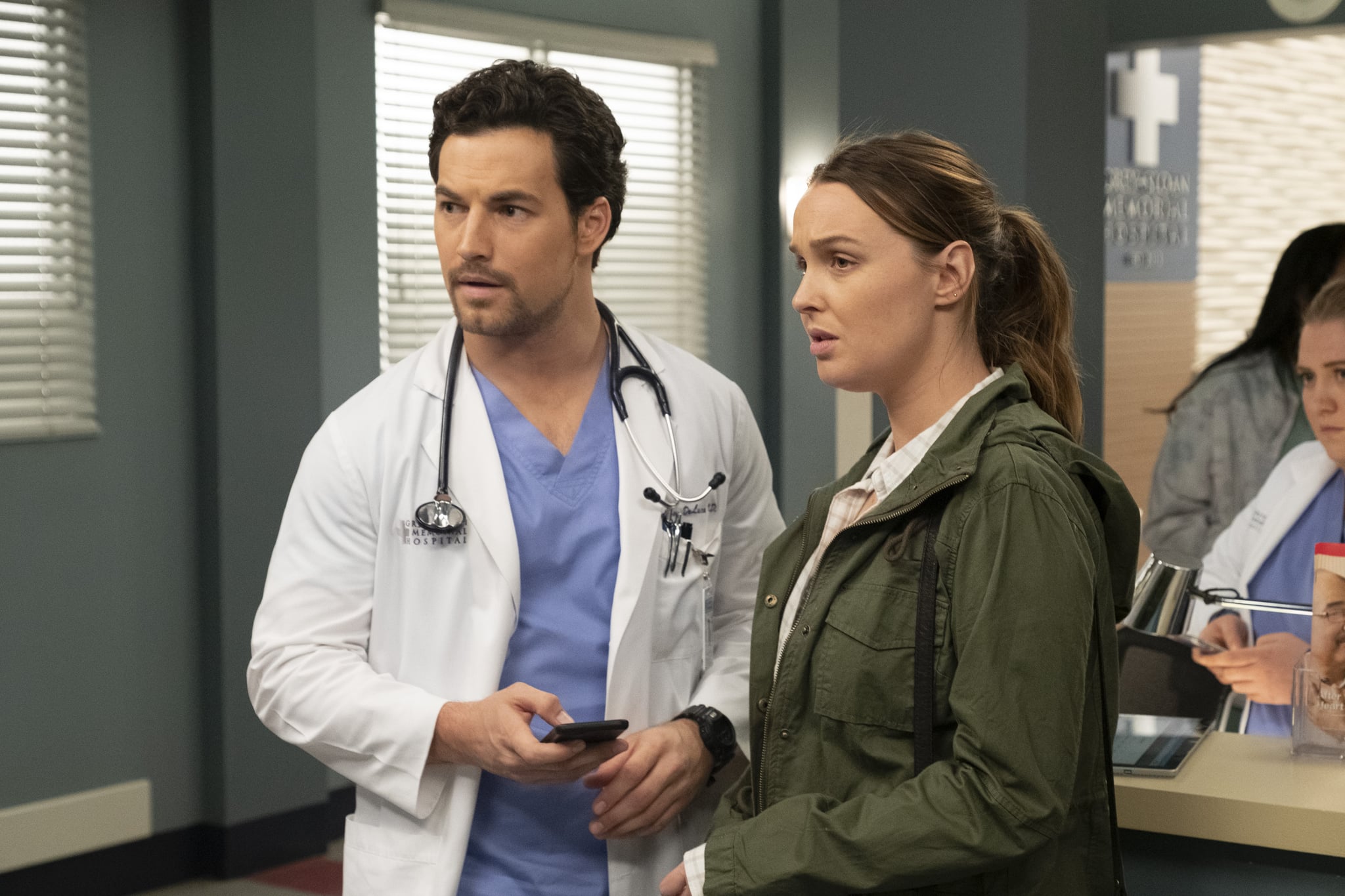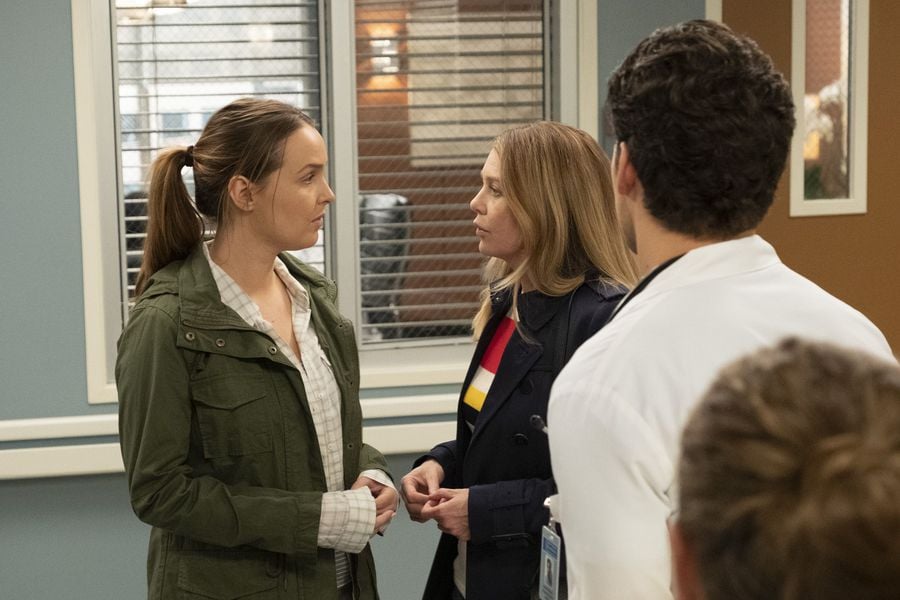
Warning: Spoilers for the season 15 finale of Grey's Anatomy below.
Grey's Anatomy [1] had a quieter, ultimately happier season 15 finale than what we're usually used to seeing [2]. No one dies [3], no one's life is left hanging in the balance (OK, Jackson may be in trouble . . . but we didn't hear screeching cars or screams of agony, so I'm choosing to believe he's just fine), and while three of our favourite doctors are fired, we all know that's not going to last. The person I felt the worst for while watching the finale was Koracick, gleefully putting together that damn crib, not even aware his relationship was over.
But instead of death and carnage, love was the overarching theme of this Grey's finale (as well as the whole season [4]). There's Teddy and Owen, whose baby is born healthy and under mostly normal circumstances, Nico and Schmitt, whose mom literally made me cry with her super nonchalant and loving reaction to her son coming out, and Amelia and Link definitely have something sweet brewing. Meanwhile, Meredith and DeLuca confess their love through jailhouse glass, but who I'm pretty confident they're going to pull through that mess just fine. Even Jo and Alex's storyline is filled with love. Jo is struggling. She's hurting. She is in a rough spot. But she finally confesses all that to Karev, and he loves her anyway. He's by her side right up through the last minutes, making sure she gets the help she needs.
And that's the part that irked me a little. Not that Jo is getting help — I was SO thankful to see the reality of trauma-induced depression being portrayed on television. The whole scene where Jo rallies to do what needs to be done, and then confesses to Alex that yeah, she can pull herself together for moments at a time and take care of others when that need arises, but no, she's not "OK"? That's gold. Any woman, any mother, who has ever dealt with severe depression knows it to be true. We can rally. We can put on a brave face. We can do the hard things in fits and bursts. But that doesn't mean we're OK.
The difference is that most of us wouldn't be immediately walked into a nice facility for help the minute we admit to that.
As soon as the drama subsides, Jo is escorted to the psychiatric unit. Assuming this is the unit at her hospital, you can expect she'll receive excellent care there — checked in upon daily by other doctors who love her and want to make sure she gets everything she needs to be healthy. The reality of seeking treatment simply isn't the same for most women in crisis, or most people in general.

I have dealt with anxiety my entire life [5], and when big, awful things happen around me, I have the propensity to be pushed into deep, dark depressions as well. It's not my default; that place is not where I live. But it happens, and the reality is, I may wind up there again. There are any number of things that could happen in my life that might push me back into that darkness. And I hate that. But I do what I can to prevent it. I see a therapist, I check in with my people, and I'm honest when I'm healthy about what it looks like when I'm not — so that the people who matter, the people who love me, can jump in and help if ever the need arises.
"When people reach a point where they can look their loved ones in the eye and say, 'No, I'm not OK,' they need to be escorted to help right away."
Help for me (and help for most women) looks nothing like what Jo will receive. Most inpatient clinics are extremely cost-prohibitive for the average citizen. And even if you can afford it, you're often looking at months-long waiting lists. When people are in crisis, they don't have months to wait. They need help immediately, before that darkness pushes them to make choices they can't come back from. When people reach a point where they can look their loved ones in the eye and say, "No, I'm not OK," they need to be escorted to help right away — much like Jo is. But that's not he reality most will face.
I have never received dedicated, inpatient care. There have probably been a few times in my life where I needed that, where I could have greatly benefited from that type of treatment. But it's always been out of reach for me. Even the care I do receive right now sometimes feels out of reach. I have terrible health insurance, with a $10,000 annual deductible. For that privilege, I pay more than my mortgage in premiums every month. And because my deductible is so high, my therapy appointments ($125 a pop) are all out-of-pocket.
I'm incredibly lucky in that I make decent money I can afford to prioritise my mental health. But the sad thing is, when I'm struggling mentally, that's also typically when my work suffers. The times when I so desperately need check-ins are when I'm least likely to be able to afford them. That's the vicious cycle many people with mental health issues are often fighting against: the ones who need the help the most are often the ones least able to access that help [6].
Something needs to change. We keep hearing politicians blame mental illness for everything from our evolving understanding of gender to mass shootings [7], but so far, I don't see any of them making any moves to actually increase access to mental health care. It's become a talking point they use when trying to divert attention, but not something they are actually working to resolve. And that's a shame, because all women — all people — should have access to the kind of care I'm sure we will see Jo receiving next season.
I'm thankful to see Grey's Anatomy depicting a strong, successful woman in crisis. deep depression playing out on my screen, de-stigmatizing the reality of the common condition and making it clear that anyone can suffer. Everyone should be able to ask for help, I just wish that in asking for that help, everyone could receive the same level of care.